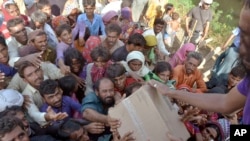The United Nations reports millions of Pakistanis remain in dire straits and in need of lifesaving humanitarian assistance as they try to recover from the worst floods to hit the country in a century.
Nearly a month after catastrophic floods devastated Pakistan, large parts of the country, especially in the southern Sindh province, remain submerged under water. Officials warn it could take up to six months for flood waters to recede in the hardest-hit areas.
Humanitarian agencies are racing to provide emergency aid to many of the 33 million people affected by the floods. But numerous roads and bridges have been washed away or damaged, cutting off access to many areas.
Gerida Birukila is UNICEF’s Pakistan chief field officer in Balochistan. Speaking from the provincial capital, Quetta, she says it is not possible to reach thousands of families surrounded by stagnant water who are in desperate need of food, clean water, medicines, and other relief.
“People are unable to find dry land on the highway with the water which is full of sewage, fertilizers, mosquitos, and viruses are flying day and night. And thousands of people are at risk.”
The United Nations reports the floods have killed more than 1,500 people, including more than 550 children. It says children also account for more than 3.4-million of the 7.6 million people uprooted from their homes.
Birukila says before the floods, malnutrition was a big problem in Pakistan. Now she says many of the most vulnerable children are at greater risk of dying without proper treatment.
“Mothers who are pregnant are not able to access the right kind of care,” says Birukila. “Last week when I was out in the field, I remember a pregnant woman caught my dress and I looked and she said, look I am eight months pregnant. I am weak and it was like over 40 degrees centigrade outside. And I could see that her eyes were white, that she was, you know, anemic.”
UNICEF has been supporting the government’s relief effort from the start. Immediately following the floods, Birukila says the agency delivered water and other essential supplies to the worst affected districts. She says the agency has set up 71 mobile health camps and temporary learning centers to help children cope with trauma.
She says much more remains to be done but UNICEF is running out of money to fund its humanitarian operation. She notes less than one third of UNICEF’S $39 million appeal has been met. She is urging international donors to support this lifesaving effort.






